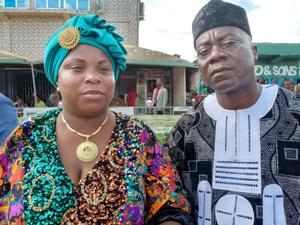CRI scientists develop 3 drought-resistant vegetables
New varieties of tomato, okra and amaranth (locally known as Alefu) that have high yields and can withstand drought and other climate change conditions in the country have been developed.
They were developed by researchers from the Crop Research Institute (CRI) of the Council for Scientific and Industrial Research (CSIR) under a project dubbed ‘’Technologies for Africa Agriculture Transformation phase two (TAAT2).
The tomato comes in two varieties, which have been named CRI-Kwabena-Kwabena and CRI-COPIA respectively, while the okra and the amaranth, also vegetables but the seeds of the amaranth eaten as grains, are yet to be branded.
A Senior Research Scientist and Head of the Horticulture Division at the Kwadaso CRI in Kumasi, Dr Michael Kwabena Osei, disclosed this to journalists during a tour of the demonstration farms at Kpetoe, Akatsi, and Adaklu in the Akatsi South, Agortime-Ziope and Adaklu districts of the Volta Region on Friday.
He said the project, funded by the African Development Bank (AfDB), was being piloted in four regions, namely Volta, Upper East, Bono and the Eastern regions.
He explained that the importance of the TAAT2 Project attracted sponsorship from the AfDB through the World Vegetable Centre, a non-governmental organisation (NGO), and aimed at ensuring successful implementation of the project to combat threats posed by climate change, which affect vegetable production.
According to Dr Osei, domestic demand for fresh tomatoes in Ghana stood at 1.2 million metric tons per year, but farmers in the country were able to produce only 30 per cent of the quantity.
“This is woefully inadequate while the development often leads to the importation of canned tomatoes with its associated health challenges,” he said.
He stressed the need for the country to focus on irrigation farming to ensure all-year vegetable and other food crop production to meet the consumption demand of Ghanaians.
A Research Associate of the World Vegetable Centre (World Veg), Mr Paul Alhassan Zaato, said his outfit had decided to promote vegetable production in Ghana through CSIR- CRI.
This, he said, was because it had the capacity to investigate and develop new varieties of tomatoes, okra and amaranth that could withstand climate change, to boost vegetable farming in the country.
A tomato farmer at Kpetoe, Mr Bright Tornu, who has cultivated vegetable for the past 15 years, said the new varieties of vegetables were promising and stressed the need for their seeds to be made available to farmers at affordable prices at all times.
“The major problem confronting vegetable farmers in the country is the high cost of fertilisers and pesticides,” Mr Tornu said.
He, therefore, appealed to the government to reduce the cost of fertilisers and pesticides to enable farmers to expand their farms.
The 150 vegetable farmers, including 52 women, involved in the tour, were taken through modern methods of vegetable cultivation and the effective use of fertilizer and pesticides.
FROM SAMUEL AGBEWODE, KPETOE
The post CRI scientists develop 3 drought-resistant vegetables appeared first on Ghanaian Times.








